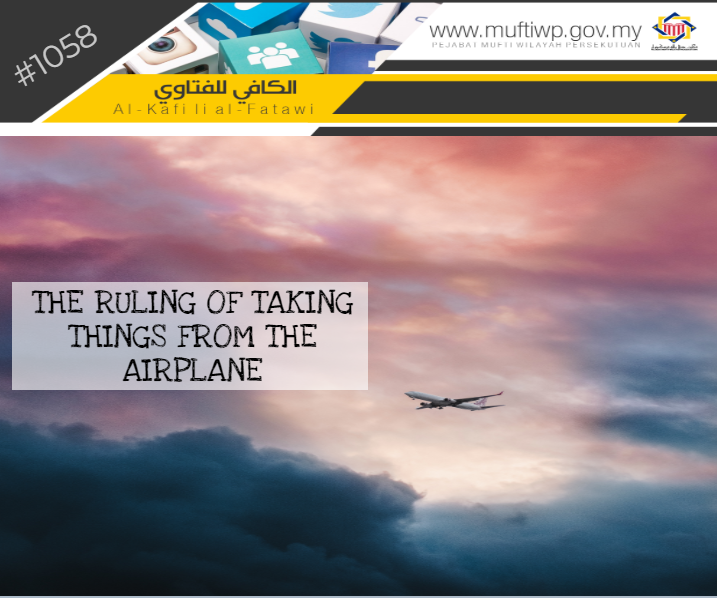Question:
Assalamualaikum. What is the ruling of taking things in the airplane such as a blanket and pillow?
Answer:
Waalaikumussalam. Alhamdulillah, praise and thanks to Allah for the many countless blessings He has blessed us all with. Blessings and salutations to the Prophet Muhammad PBUH, his wives, his family, companions and all those that follow his teachings to the day of judgement.
Regarding the matter of benefitting from the property of others which is not our right, Allah SWT state in the Quran:
يَا أَيُّهَا الَّذِينَ آمَنُوا لَا تَأْكُلُوا أَمْوَالَكُم بَيْنَكُم بِالْبَاطِلِ إِلَّا أَن تَكُونَ تِجَارَةً عَن تَرَاضٍ مِّنكُمْ ۚ وَلَا تَقْتُلُوا أَنفُسَكُمْ ۚ إِنَّ اللَّـهَ كَانَ بِكُمْ رَحِيمًا
“O you who have believed, do not consume one another's wealth unjustly but only [in lawful] business by mutual consent. And do not kill yourselves [or one another]. Indeed, Allah is to you ever Merciful.”
Surah al-Nisa’ (29)
In commenting on the above verse, Syeikh Sayyid Tantawi wrote in his book stating: “In the verse, Allah SWT commanded Muslims to not eat from the property of others unjustly and if they do, it will lead to the path of sin and transgressions.” (Refer Tafsir Al-Waseet Li Tantawi: 3/125)
The same is stated in a hadith of the Prophet PBUH from Amru bin Yathribi, where the Prophet PBUH said:
وَلَا يَحِلُّ لِامْرِئٍ مِنْ مَالِ أَخِيهِ إِلَّا مَا طَابَتْ بِهِ نَفْسُهُ
“The usage of another’s property is prohibited unless with their consent.”
Musnad Ahmad (15488)
This is in accordance with the Islamic legal maxim stated by Syeikh Mustafa Zarqa in his book:
لا يجوز لأحد أن يتصرف في ملك الغير بلا إذنه
“It is impermissible to use the property of others without his consent.” (Refer Syarah Al-Qawaid Al-Fiqhiyyah: 461)
It is clear that Islam emphasizes the matters of permissibility and impermissibility especially in terms of ownership and property in order to attain the blessings from Allah SWT and not being unjust to others. The Prophet PBUH restricts anyone from taking what is not theirs. From Abdullah bin Saib bin Yazid, he heard the Prophet PBUH said:
لاَ يَأْخُذَنَّ أَحَدُكُمْ مَتَاعَ أَخِيهِ لاَعِبًا وَلاَ جَادًّا وَقَالَ سُلَيْمَانُ " لَعِبًا وَلاَ جِدًّا " . " وَمَنْ أَخَذَ عَصَا أَخِيهِ فَلْيَرُدَّهَا
“None of you should take the property of his brother in amusement (i.e. jest), nor in earnest. The narrator Sulayman said: Out of amusement and out of earnest. If anyone takes the staff of his brother, he should return it.”
Sunan Abu Daud (5003)
Dr Wahbah Zuhaili state in his book: “Scholars agreed that it is obligatory to return anything that one has taken from its owner in the same state as it was taken.” (Refer Al-Fiqh Islami Wa Adillatuhu: 6/4800)
Conclusion
Answering the above question, we found that different airlines have different policies regarding the things made available to passengers; whether it is permissible to be taken or not. If one travel for long-distance, usually the airline would present a gift bag containing toothbrushes and toothpaste to the passengers. It may vary according to the classes of the flight itself, as to whether they are allowed to be taken by passengers.
As for emergency equipment such as life jackets and masks or reusable things that are prepared for passengers by the airline such as blankets and pillows, it cannot be removed from the airplane according to the policy of the airline as well as for the safety of passengers.
For those who have taken things from an airplane, he should repent and increase his istighfar and ask for His forgiveness for his past sins. He should also never repeat the same mistake again. Allah SWT state:
عَفَا اللَّـهُ عَمَّا سَلَفَ ۚ وَمَنْ عَادَ فَيَنتَقِمُ اللَّـهُ مِنْهُ ۗ وَاللَّـهُ عَزِيزٌ ذُو انتِقَامٍ
“Allah has pardoned what is past; but whoever returns [to violation], then Allah will take retribution from him. And Allah is Exalted in Might and Owner of Retribution.”
Surah al-Maidah (95)
Wallahua’lam.


